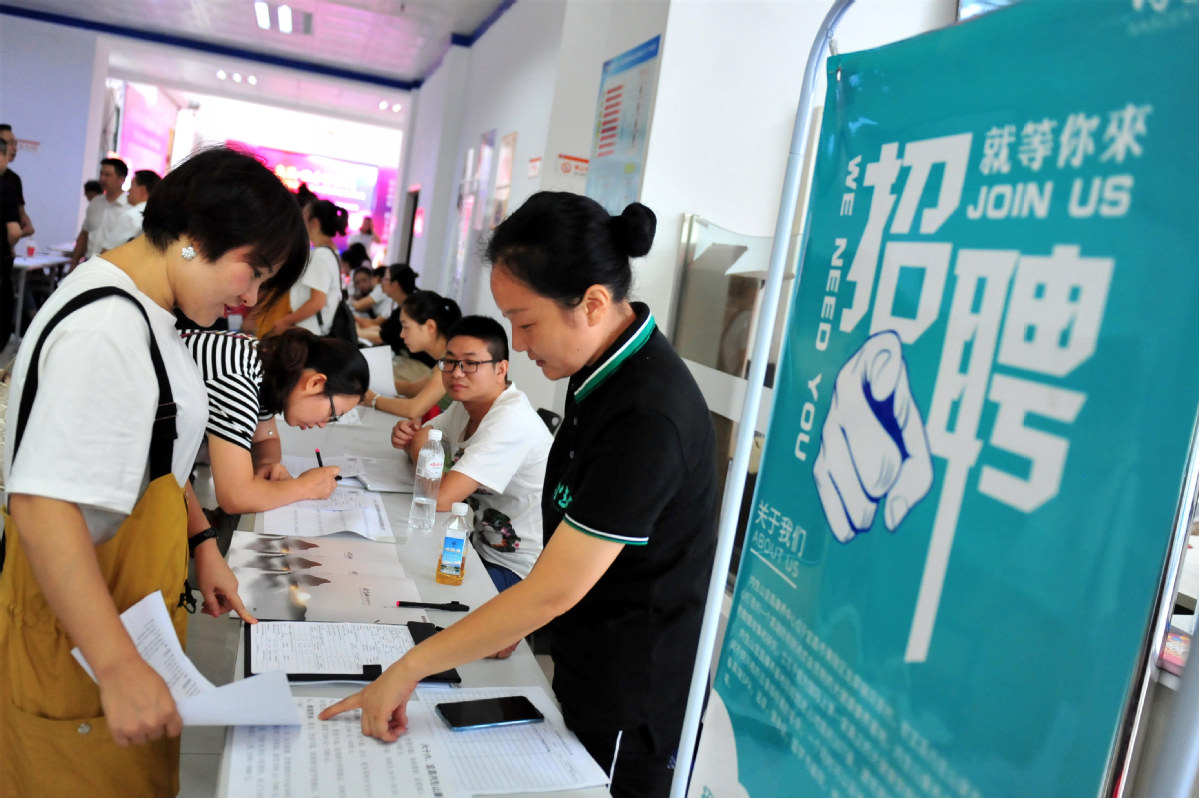Report shows aging workers aren't a problem but a potential advantage
By ZHU WENQIAN | China Daily | Updated: 2019-09-16 08:04

Aging workers, if given fresh training and imparted new skills, could prove a blessing in disguise at a time of talent shortages, a new industry report has found.
Chinese employees who work at government departments and government-affiliated institutions have shown a more obvious aging trend compared with private firms and foreign companies, the survey report from Zhaopin, an online recruitment company, said.
Among employees working at government institutions, 28.3 percent of the total staff are aged 46 and above, according to Zhaopin, which surveyed all types of enterprises nationwide this summer.
Rise in the number of aging people in China at a time of declining birth rate has resulted in a rapidly aging labor force at Chinese enterprises, experts said.
Employers should offer opportunities to train older employees and help them to gain new skills, and thus transform the challenge into a talent advantage, they said.
What enterprises worry about the most is that older employees may be conservative and less innovative, and the aging labor force will affect the introduction and promotion of young talent.
"Some enterprises did not fully realize the value of the elderly labor force. In fact, well-educated and experienced older employees can still give full play to their talent at different companies, especially in the field of research and development, and they can help guide younger employees," said Guo Sheng, CEO of Zhaopin.
"Employers should avoid wasting useful resources like middle-aged and elderly labor force. Instead, they should keep, retrain and recruit older employees, and provide tailored and long-term opportunities to study, so that companies can fulfill their labor demand," he said.
On average, the aging problem of employees at first-tier cities is more significant than smaller cities in the countries.
Meanwhile, when it comes to young talent, around 3.6 million people, or 44.2 percent of total new graduates this year, said they would prefer to work in new first-tier cities-that is, second-tier cities with top economic growth vitality. Those cities include Chengdu, Chongqing, Hangzhou, Wuhan and Xi'an, the Zhaopin report found.
The group is followed by graduates who would like to work in first-tier cities such as Beijing, Shanghai and Guangzhou. They accounted for 30.6 percent of the total. Many students said work pressure and ever-increasing living costs in top cities made them stressful, the report found.
The demographic dividend in China, the world's most populous country with 1.4 billion people, is gradually weakening. Last year, the birth rate in the country touched a record low of 1.09 percent since 1949, and there were 249 million people aged 60 and above, hitting a record high, according to the National Bureau of Statistics.
In 2018, total labor force dropped 4.7 million compared with 2017, down 0.6 percent year-on-year. In the next few years, total labor force will continue to decline, and enterprises will face a further aging talent market, industry experts predicted.
In the past decade, some domestic private technology companies such as Alibaba Group Holding Ltd and Huawei Technologies Co grew rapidly, and they have attracted a large number of young talent. More than 37 percent of private companies said they found a decline in the average age of employees in the past three years, according to the report.
For most foreign companies, the current period marks mature and steady growth in China. Equipped with comprehensive regulations and good salaries and benefits, the turnover rates have been relatively low at foreign companies and the average employee age is increasing.
In addition, labor-intensive companies face the most serious aging problem, as those enterprises are no longer attractive to young employees. Young people are willing to look for more professional jobs with higher pay. The housekeeping service sector and catering sector are facing difficulties in recruiting young workers, and the majority of employees are aged 40 and above, the Zhaopin report found.
"The dividend of talent is the biggest dividend to the development of China in the future, so enterprises should offer more convenience to the aged population who are willing to work," Guo said.
Lu Xin, former vice-minister of education, said earlier that skilled and talented senior citizens would be the new driving force of economic growth.
























